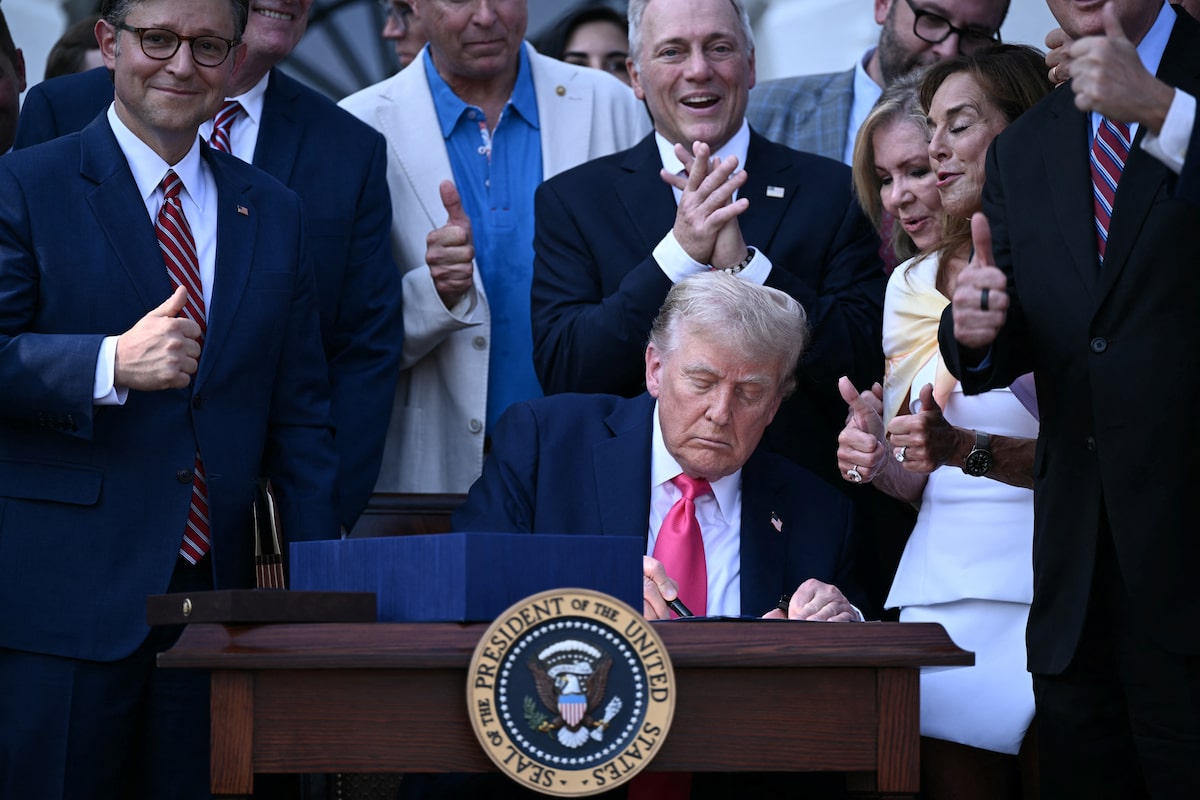U.S. President Donald Trump signed the ‘One Big Beautiful Bill Act’ on July 4, making several changes intended to spur business growth in the U.S.BRENDAN SMIALOWSKI/AFP/Getty Images
A relatively favourable corporate tax regime in the U.S., lingering trade uncertainty, and tariffs represent a challenge for Canadian policy-makers looking to encourage capital investment and boost productivity, following the passage of U.S. President Donald Trump’s One Big Beautiful Bill Act, tax experts say.
The U.S. tax bill, which Mr. Trump signed into law on July 4, made several changes meant to spur business growth in the U.S., including making permanent the full expensing of qualified business property and the deductibility of domestic research and experimental expenditures, and raising the limit for deductibility of business interest expenses.
The bill made no change to the federal corporate tax rate, which had been reduced to 21 per cent under the 2017 U.S. Tax Cuts and Jobs Act (TCJA) from 35 per cent previously. That reduction eliminated the corporate tax rate advantage Canada used to have relative to the U.S.
While the Canadian federal corporate rate is 15 per cent, below the U.S. federal rate, when comparing average combined federal and provincial/state corporate tax rates, the two countries are more in line: 26.1 per cent in Canada versus 25.6 per cent in the U.S., according to the Tax Foundation, a policy think tank based in Washington, D.C.
However, businesses looking to invest in Canada, especially in long-term infrastructure and resources development, “will look for some sort of a premium to compensate them” for the risks associated with tariffs and uncertain access to the U.S. market, says Fred O’Riordan, national leader of tax policy with EY Canada in Ottawa.
“The tax wedge is important because for any of these major investments, especially in the area of natural resources, [businesses] need to achieve some sort of hurdle rate to get to a final investment decision.”
Where both domestic and foreign investors might have seen Canada’s preferred access to the U.S. as a major attraction, “now there’s a lot of uncertainty whether we can retain that,” Mr. O’Riordan says. “We need to have overall competitiveness, and tax is part of that – it can’t be ignored.”
Brian Ernewein, senior advisor, national tax at KPMG LLP in Ottawa, says “the world’s a bit different” compared with when the TCJA passed during Mr. Trump’s first term.
Following the TCJA, Canada responded with temporary measures to provide faster write-offs for depreciable property and immediate expensing for certain manufacturing equipment and clean technology assets.
However, with the passage of the U.S. tax bill earlier this month, “[U.S. tax] incentives are permanent, not temporary, and we don’t seem to have the same kind of prospect that the U.S. corporate tax rate might bounce back up.”
Mr. Ernewein says the federal government’s proposal to reinstate immediate expensing, first made in its 2024 fall economic statement and repeated in the 2025 election campaign, “is all to the good. It’s what the government should be doing.”
Julia Klann, partner, national leader of U.S. corporate tax at Doane Grant Thornton LLP in Waterloo, Ont., says she doesn’t believe the passage of the U.S. bill puts Canada at a significant disadvantage to the U.S. in terms of corporate tax, as the bill reinstated or made permanent changes first introduced in the TCJA.
For Ms. Klann, Canada’s greater concern remains broader initiatives in the U.S. to encourage business investment and to relocate jobs back to the U.S.
If the U.S. chooses to focus on such policies, “I can see a lot of [Canadian] businesses thinking about continuing to expand south of the border, knowing that there are a lot of tax incentives for doing so.”
A C.D. Howe Institute report released this month argued that Canada’s “corporate income taxes are uncompetitive, undermining the investment we need to become more productive and raise workers’ wages.” Both individual and corporate income tax rates “should come down,” the report stated. If the government needs additional tax revenue, it should consider raising the GST rate instead, it said.
Department of Finance spokesperson Benoit Mayrand said in a response sent by e-mail to questions from The Globe that the federal government is “carefully reviewing the content of the One Big Beautiful Bill Act” and the “implications it may have on Canadians.”
However, he did not provide a direct response to a question regarding whether the government was considering lowering corporate tax rates.
The government would provide further details in a comprehensive federal budget this fall, he said.
In addition to immediate expensing, the Liberals advanced several other proposals meant to spur business investment in last year’s fiscal update and during the election campaign. These included expanding flow-through shares to Canadian technology startups, introducing a 20-per-cent artificial intelligence adoption tax credit, enhancing the scientific research and economic development (SR&ED) program, and introducing a patent box regime.
The Liberals also said they would conduct an expert review of the corporate tax system. The government hasn’t announced a timeline for that review.
John Oakey, vice-president of taxation at CPA Canada, says he’d welcome a review, suggesting a less complex corporate tax system would help attract business investment.
“It is becoming a very burdensome [tax] system and it’s becoming very costly to comply,” he says.

